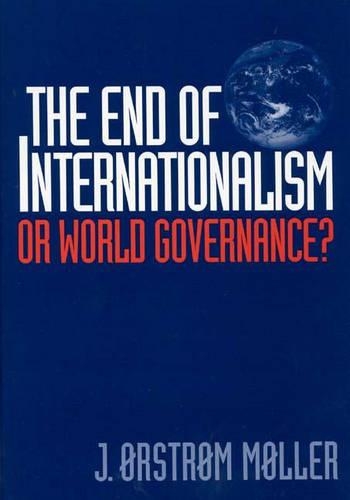
The End of Internationalism: Or World Governance
(Hardback)
Publishing Details
The End of Internationalism: Or World Governance
By (Author) J. Moller
Bloomsbury Publishing PLC
Praeger Publishers Inc
28th February 2000
United States
Classifications
Tertiary Education
Non Fiction
International economics
Economic forecasting
327.101
Physical Properties
Hardback
224
Description
Since 1945, the world has moved, haltingly but relentlessly, toward internationalism. And with the end of the Cold War and the apparent dominance of the West and its democratic and free-market systems, that march toward internationalism has proceeded apace, seemingly unstoppable. Or is it With the Asian financial contagion spreading worldwide, the Russian democratic experiment coming undone, and cultural-ethnic violence flaring up around the world, one wonders. Ambassador Moller examines some of the major trends in the world system as we approach the new millennium: the stresses of globalization, the future role of the nation-state, the free-market system versus state-managed capitalism, and democratic pluralism versus Asian/Islamic/African/and other values. And he brings to this examination his background as a futurist, as a trade and economic affairs negotiator in the European Union, and as Ambassador to Singapore, one country where all these dynamics are at work. The larger question raised by Ambassador Moller is: Are we poised on the brink of a new and truly internationalist millennium, or is this a sort of neo-Wilsonian phase destined for an abject and abrupt end This book should be of interest to concerned citizens, futurists and scholars and students of international relations around the world.
Reviews
"In thoroughly contemporary terms, this book sets out the tensions emerging between elites and population around the world over the terms, forms, and consequences of globalization--not only of economics, but culture and politics."-Richard Parker Senior Fellow, Shorenstein Center on the Press, Politics and Public Policy Kennedy School of Government Harvard University
"J. Orstrom Moller, one of our most creative international thinkers, argues that the real threat to world order comes neither from military threats from new great powers menaces nor from rapid economic globalization. It stems from the fact that globalization is far less deeply embedded in modern societies and polities than we think. Can internationalism withstand prolonged economic dislocation of the weak Ideological reaction in traditionally isolated cultures Disorder arising from an increasingly interdependent global society Only a new form of a world governance, Moller argues in this provocative analysis, can successfully address these challenges."-Andrew Moravcsik Associate Professor of Government Harvard University
"This book provides a cogent view of the social and political consequences of global business. It is essential reading for global managers who need to understand the broader context and effects of their strategies."-George S. Yip Beckwith Professor of Management Studies Judge Institute Cambridge University
"In his short and sharp way, Moller forces us to confront all these pertinent issues...though one may not agree entirely with the prognosis and the answers or solutions he provides, he raises enough fundamental questions for anyone with any interest in the future, and for those who look beyond their immediate existence to try to make sense of what is happening around them."-International Herald Tribune
"This scholarly, comprehensive, and fair book addresses a critically important topic that, sadly, few people have the patience to understand."-The Futurist
These remarkably candid views should become the basis of discussion and debate reminiscent of past musings by integrationists. Recommended for upper-division undergraduates and above.-Choice
""This scholarly, comprehensive, and fair book addresses a critically important topic that, sadly, few people have the patience to understand.""-The Futurist
"These remarkably candid views should become the basis of discussion and debate reminiscent of past musings by integrationists. Recommended for upper-division undergraduates and above."-Choice
""In his short and sharp way, Moller forces us to confront all these pertinent issues...though one may not agree entirely with the prognosis and the answers or solutions he provides, he raises enough fundamental questions for anyone with any interest in the future, and for those who look beyond their immediate existence to try to make sense of what is happening around them.""-International Herald Tribune
Author Bio
J. RSTRM MLLER is Danish Ambassador to Singapore. Formerly the State Secretary in the Danish Ministry of Foreign Affairs, Ambassador Mller is the author of 28 earlier books, including The Future European Model (Praeger, 1995).
